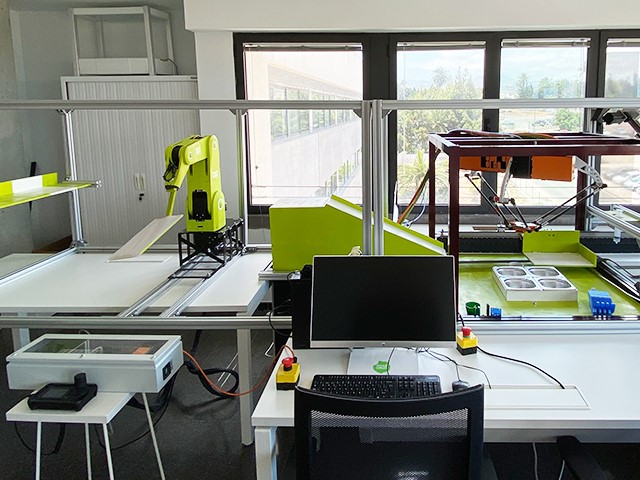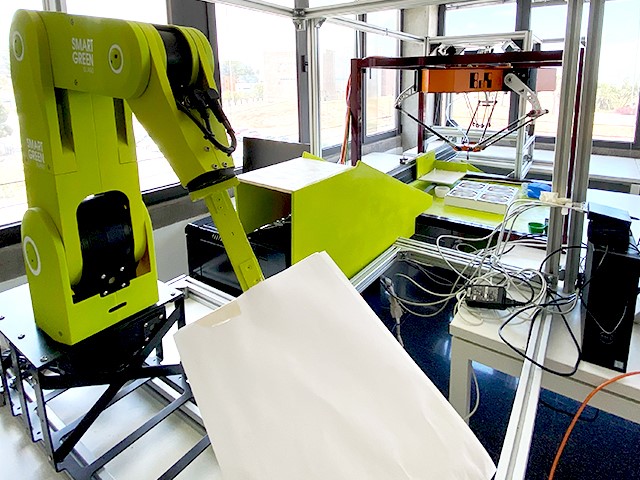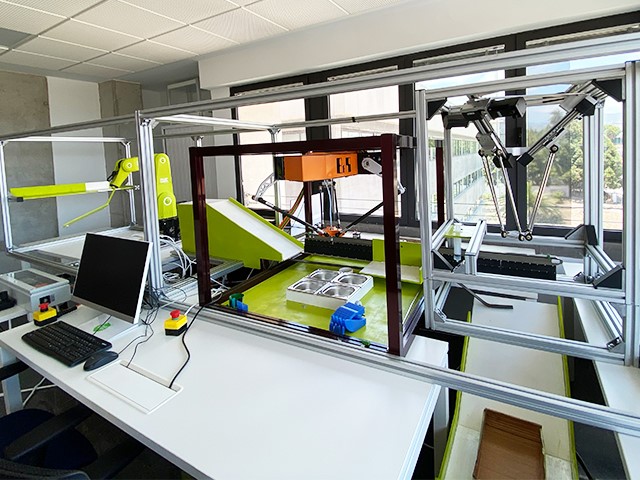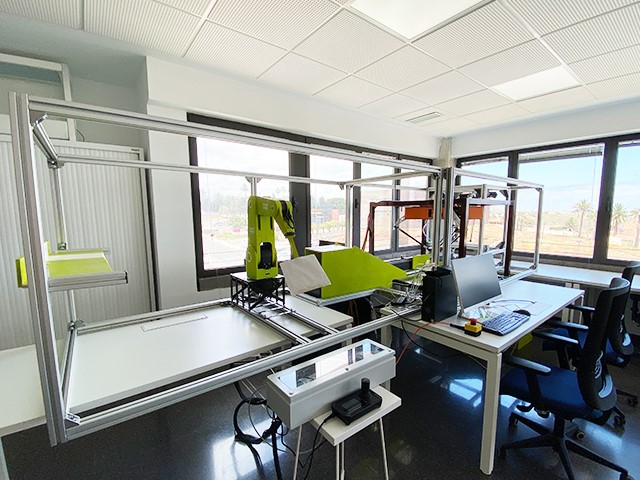Sandwich Robot
“Innovation through Education 4.0 and real industry hardware”
About the project
The Sandwich Robot Demonstrator was developed during a two-month Summer Internship Program. Involved in the development process was an international and interdisciplinary team of 5 students from the University of Cambridge and the University of Las Palmas de Gran Canaria. The special feature of the Sandwich Robot project is that the demonstrator consists of several devices and hardware from different companies.
The materials were sponsored as part of this educational project. Thus, the Sandwich Robot is composed of a Robot Arm and Delta Robot from the company igus, an XTS Rail from the company Beckhoff, a Delta Robot from the company B&R and Phoenix Contact which acts as one unit. With the help of the existing industrial hardware, which was provided by the participating companies, innovative solutions can be realized. The students can directly program the PLC’s of different manufacturers and thus bring the plant to life. By using the latest technologies like the OPC UA protocol, the hardware of different manufacturers can be used, and the plant can communicate beyond its interfaces.
For the user of the Sandwich Demonstrator to receive a finished product, they must customize the sandwich before the manufacturing process. Through an app made specifically for the Sandwich Robot, the operator can first select their own preferred type of bread. Then they can choose their individually desired toppings, as well as the sauce(s). As soon as the user has assembled the sandwich via the app, the Sandwich Robot starts preparing it. In the first step, the igus Robot Arm brings the bread to a rail fixture of the XTS rail, which forwards the bread to two Delta Robots. The Delta Robots then load the sandwich with the selected ingredients. Now the sandwich can be removed and eaten by the operator.
Behind the project
In recent decades, our society has increasingly become a performance and knowledge-oriented society. As a result, the education of children, adolescents and young adults consists mainly of theoretical content instead of practical experience. With the Sandwich Robot we addressed this problem of an ineffective education system. As we have an agreement with the University of Cambridge every summer, we provide training to a group of young highly motivated students. The internship period is usually 2-3 months. During our SMART GREEEN ISLAND MAKEATHON 2020 it happened that one of our sponsors, in this case igus, decided to sponsor a new student project in Gran Canaria. After that, igus send us some industrial robots, a delta one and a 6 axis one with their corresponding PLCs and linear axis.
The group of 5 engineering students, who arrived in June 2020 in Gran Canaria as part of their internship, were required to decide, the use case for the project but considering that all hardware provided must be used, i.e. igus hardware plus the other manufacturers (B&R, Beckhoff and Phoenix Contact) one as well. All those systems have own development environments and that challenges the students to develop interfaces for interconnecting them.
They presented the option of building a use case related to food processing – so they proposed a sandwich manufacturing line. Their proposal was defended with solid engineering arguments which proved that all hardware would be integrated together. The final machine was easily usable by non-technical users through a user interface integrated in a web dashboard. Those are few of the interesting technical challenges regarding the project. We also want to keep the innovation as part of the company spirit and stay updated with latest technology trends and projects like this allow us to do so.
Furthermore, the idea of a robotics demonstrator allowed us to integrate different modules like project management, product development, software development, interaction design, mechanical design, physics, among others. This was a major step in the direction of innovative and interdisciplinary education, as it promoted creativity and personal responsibility within the framework of Education 4.0.
Importance of the project
It is very important that young people gain practical experience to be able to deal with unpredictable situations, as well as to be able to solve them through creative (re)thinking – true to the motto “Learning by Doing”.
The Sandwich Robot project follows exactly this principle. Within the framework of the project, young people are trained with real and solid industrial hardware. Furthermore, such projects or demonstrators can be used to make topics such as Automation, Batch size 1 Manufacturing, IoT and Robotics more tangible and learnable within a very short time. We also created an opportunity to better prepare young talents for future technologies and to get them excited about technology.
In addition, the project is meant to encourage young people to show initiative in solving problems and to develop innovative solutions and ideas in the field of Smart & Green Technologies. This includes the process from the collection of ideas to the finished product, using real industrial hardware. This contributes to an important aspect of learning development and promotes many skills such as complex thinking and international and interdisciplinary teamwork.
Moreover, we were able to promote direct contact and exchange between the young talents and the respective companies. This in turn creates a suitable basis for finding qualified specialists more easily. By getting several sponsors involved, we checked that box. In this way, the young generation will be able contribute to their future and develop real smart machines and systems, from which the participating companies can benefit as well. After all, the young generation should learn to be able to tackle projects quickly and implement them in an innovative way.
Our vision
The focus of these projects is on bringing future technologies to life for young talents in the field of Smart & Green Technologies and Industrie 4.0. With the help of such demonstrators, we succeed in better clarifying complex interrelationships and getting students excited about future technologies. In addition, practical training can promote a good basis for interdisciplinary and international teamwork and establish cooperation with various industrial partners.
Another significant aspect is that through such projects, in which demonstrators are developed, the next generation of students can gain their own experience of what is possible in terms of digitalization and Smart & Green Technologies. The entire process from the beginning of a still undefined idea to its realization, extremely motivates young people to continue to collect new ideas and to implement them directly. Thus, not only theoretical assumptions are collected, but also new knowledge is acquired through practical work.
That is why, we believe the development and implementation of real demonstrators offer the best opportunity to acquire new knowledge quickly and effectively, and to exchange the know-how gained with each other. Ideally, this leads to a kind of chain reaction in which the participants tell other young talents about this experience and inspire them to participate in common further future projects.







